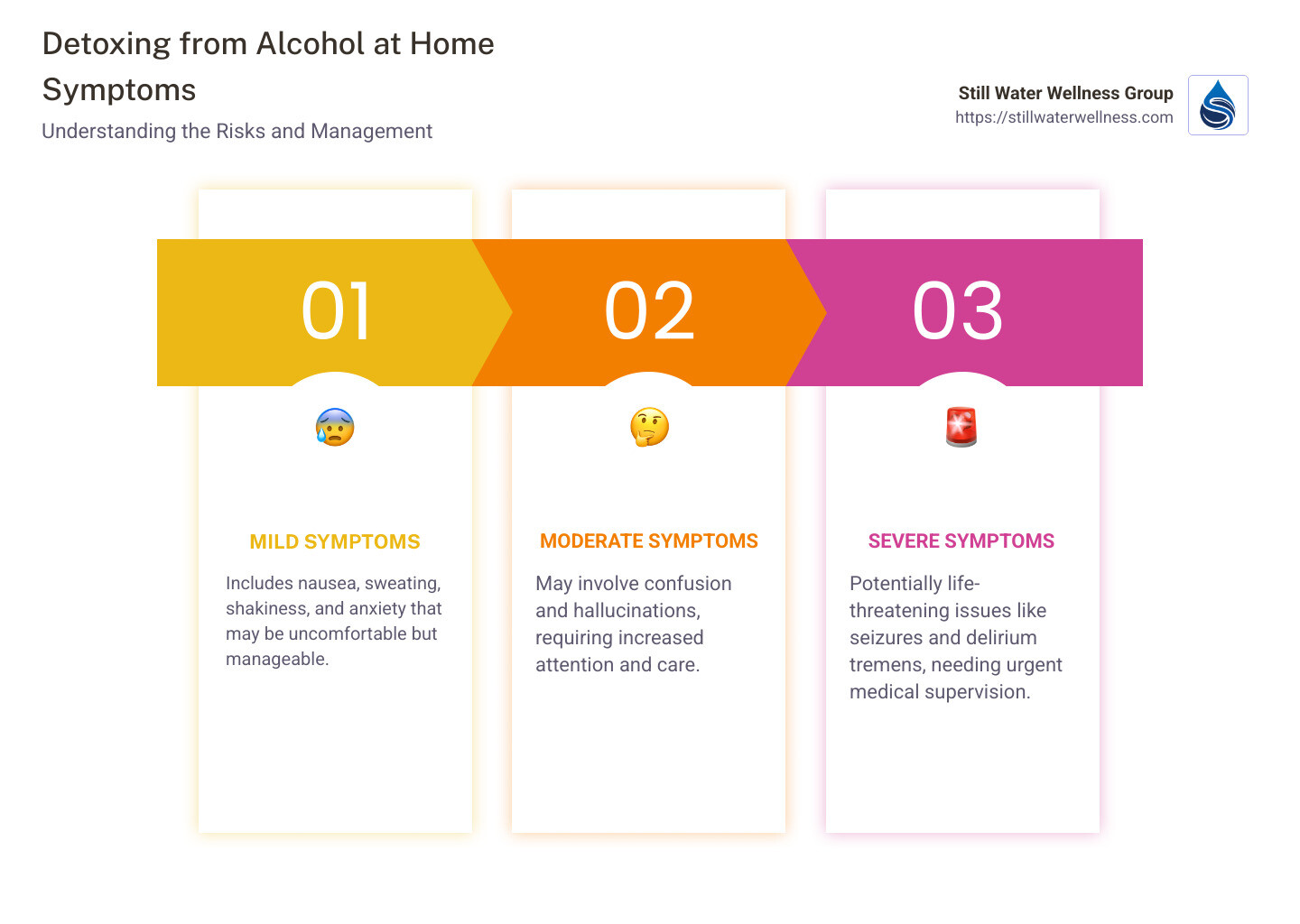Detoxing from alcohol at home symptoms can be challenging and even dangerous, particularly for individuals with a dependency. These symptoms arise when someone who regularly drinks alcohol suddenly stops or significantly reduces their intake. Here’s a quick look at what to expect:
- Mild Symptoms: Nausea, sweating, shakiness, and anxiety.
- Moderate to Severe Symptoms: Confusion, hallucinations, seizures, and in rare cases, delirium tremens, which can be life-threatening.
Alcohol withdrawal is more than just an uncomfortable experience; it’s a medical condition that requires careful attention. Detoxification marks the beginning of this process, as the body starts to eliminate alcohol. But this isn’t a solitary journey—symptoms can vary greatly based on several factors, including drinking history and overall health.
While some might consider home detox due to convenience or privacy, it’s crucial to remember that unsupervised detoxification can have serious health risks. Preparing properly and being well-informed is essential for safety and success.

Understanding Alcohol Withdrawal
Alcohol Withdrawal Syndrome (AWS) is the body’s response to suddenly stopping or reducing alcohol intake after prolonged use. This syndrome can manifest in various symptoms, which are typically categorized into mild, moderate, and severe stages. Understanding these symptoms is crucial for anyone considering detoxing from alcohol at home.
Mild Symptoms of Alcohol Withdrawal
In the early stages of AWS, individuals often experience mild symptoms. These can include:
- Headaches: Common and often persistent, headaches can be one of the first signs of withdrawal.
- Anxiety: A heightened sense of worry or nervousness is typical and can be quite unsettling.
- Insomnia: Difficulty falling or staying asleep is a frequent complaint, adding to overall fatigue.
These symptoms, while uncomfortable, are usually manageable with proper care and support. However, they can escalate if not addressed promptly.
Moderate to Severe Symptoms
As withdrawal progresses, symptoms can intensify, leading to more serious health concerns:
- Hallucinations: Seeing or hearing things that aren’t there can occur, indicating more severe withdrawal.
- Seizures: These are sudden and can happen within the first 12 hours after stopping alcohol. They require immediate medical attention.
- Delirium Tremens (DTs): This is a rare but life-threatening condition characterized by confusion, rapid heartbeat, and fever. It demands urgent medical intervention.
Each individual’s experience with AWS can differ, but recognizing these symptoms is vital for anyone considering detoxing from alcohol at home. It’s essential to approach this process with caution and, ideally, under medical supervision to ensure safety and mitigate risks.
Detoxing from Alcohol at Home Symptoms
Choosing to detox from alcohol at home can be a challenging yet significant step towards recovery. However, it’s crucial to approach this decision with caution and readiness. Understanding the symptoms and ensuring a safe environment are key to a successful detox journey at home.
Preparing for Home Detox
Safety First: Before beginning a home detox, consult with a healthcare professional. They can help assess whether it’s safe for you to detox at home or if medical supervision is necessary. This is especially important if you’ve experienced severe withdrawal symptoms in the past.
Schedule and Support: Create a detox schedule and stick to it. Having a routine can provide structure during this challenging time. Surround yourself with supportive friends or family members who understand what you’re going through. Their presence can be comforting and provides an extra layer of safety.
Environment: Prepare your surroundings to be as calming and alcohol-free as possible. Remove all alcoholic beverages and anything that might trigger cravings. Create a comfortable space with soft lighting and soothing music, which can help you relax and focus on recovery.
Managing Symptoms at Home
Hydration: Staying hydrated is crucial. Alcohol withdrawal can lead to dehydration, so drink plenty of water and electrolyte-rich fluids. This will help your body flush out toxins and maintain balance.
Nutrition: A balanced diet can support your body during detox. Focus on nutrient-rich foods like fruits, vegetables, lean proteins, and whole grains. These can help replenish nutrients and stabilize blood sugar levels, reducing cravings.
Relaxation: Stress management is vital during detox. Practice relaxation techniques such as deep breathing, meditation, or gentle yoga. These activities can help alleviate anxiety and promote better sleep.
Detoxing from alcohol at home can be manageable with the right preparation and support. However, always prioritize safety and seek medical advice to ensure a smoother and safer detox process.
Conclusion
Recovery from alcohol addiction is a journey, and taking the first step by detoxing is a significant milestone. Yet, detox is just the beginning. Long-term recovery involves ongoing support and commitment.
Support groups like Alcoholics Anonymous or LifeRing can be invaluable. They offer a community of people who understand what you’re going through and can share their experiences. Joining a support group can help you feel less alone and provide encouragement along the way.
At Still Water Wellness Group, we understand the challenges of alcohol addiction and the courage it takes to seek help. Our programs are designed to support you through every stage of recovery. With our serene environment near Saddleback Mountain and Laguna Beach, we offer a tranquil setting for healing. Our compassionate and expert care focuses on personalized treatment plans that address your unique needs.
If you’re considering detoxing from alcohol at home, ensure you have the necessary support and resources. However, if you find the process overwhelming or face severe symptoms, don’t hesitate to reach out for professional help. At Still Water Wellness Group, we’re here to guide you towards a healthier future.
For more information on how we can support your recovery journey, visit our Alcohol Detox Program. Recovery is possible, and with the right support, you can achieve lasting sobriety.
